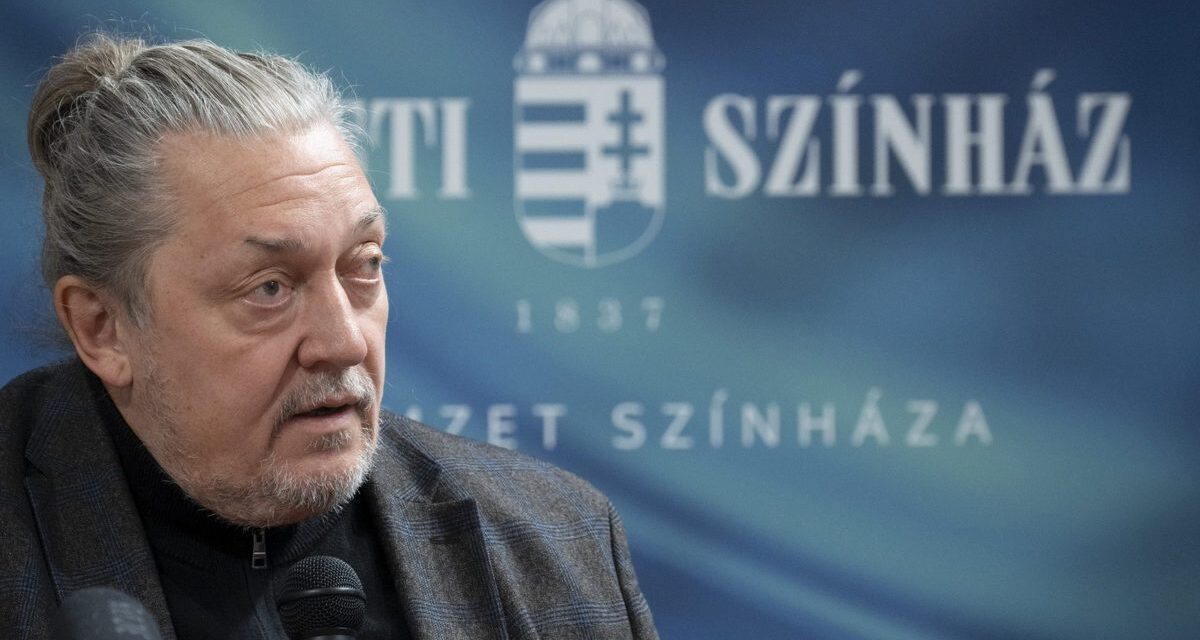In an open letter, the director of the National Theater responded to György Cserhalmi's accusations.
The Kossuth and Béla Balázs award-winning actor György Cserhalmi also reported on some stories related to Attila Vidnyánszky in his newly published book Nem lehte szádzéd meghlin. Index reported the news which Mandiner .
Attila Vidnyánszky did not leave it at that. In his opinion, the Kossuth and Béla Balázs prize-winning actor's claims are "all false or only partially true. He emphasized that "it can be terrible to live a whole life along such soul-crushing alignment constraints."
Attila Vidnyánszky's open letter to György Cserhalmi, published in Origó,
"Dear Gyuri!
When I signed you to Debrecen as the director of the Csokonai Theatre, I was honestly proud because I thought that the artistic life of the theater would be enriched with you. In addition to the professional one, a human relationship soon developed between us: from our conversations and exchanges on our long journeys to Budapest, I concluded that you came to Debrecen not only because you do not consider the theater situation in Budapest particularly good, but also because the spiritual -artistic work that we represent in Debrecen. We could agree on many things.
Later, I asked you to lead a class at Kaposvár University, because I thought that the knowledge you have must be passed on, and I did a lot to ensure that this knowledge met the new generation. Based on what you said at the time, and the thoughts you shared with me, I felt that you did not get such an opportunity many times, neither from the University of Theater and Film, nor from Kaposvár. When the situation changed due to your illness, I brought your entire class from Kaposvár, including Juli Szász, to the National Theatre. I tried to provide the best conditions for them.
Upon your return, I welcomed you at the National Theater in Pest: to this day I regret that, due to your illness, we were only able to rehearse the Lord's Wall until the end of the first act.
Even in the current situation, the long conversations we had on the way to Budapest are still alive in me: about regime change, theater profession, Hungarian history, Zoltán Latinovits, Gábor Bódy.
I will carry their memory for a lifetime, as you spoke very honestly about the political situation, profession, and history: it would not be fair if I quoted you.
Perhaps there is only one jarring, dissonant sentence that comes out of these conversations, which unfortunately I can still hear in your voice, when you stated in relation to one of our prominent national colleagues: don't expect an actor to show character, not even from me! – it hit me then and has lived in me ever since.
In the past period, you have made several statements about me in a rather malicious manner (and factually, tendentially false).
I don't know what fuels your hatred, that's your business. You often live by quoting me, attributing sentences to me, but you don't check their reality, or you don't remember them exactly. So far, I have not publicly responded to these, but I am keeping our long message exchanges, where I told you that this is not correct, that you are spreading untrue things about me.
Now, however, I have decided to respond publicly to the Index report on your new book, because the excerpts taken out here are all false or only partially true. Let's take them one by one!
You write about one of the season finales that Vidnyánszky »Screamingly proved that, no matter what they say, this theater is the best in Hungary, and even at the international forefront. And those who left us are traitors and the experts of those who blew up the old Nemzeti.« I am really an expressive (theatre?) person, and I use to express myself openly at company meetings, but if I yell or are traitors, not only I don't remember, and neither do my colleagues. I tend to express myself emotionally, but I wouldn't confuse that with your false claims.
By the way, the National Theater - especially after the Theater Olympics - really became one of the players in international theater life. Unfortunately, we can say that there are few Hungarian theaters that have a significant presence of foreigners. Due to its spiritual significance, the National Theater goes beyond an average Hungarian theater, which is precisely why it is in the crosshairs of eternal debates.
Those who are the spiritual heirs of the cultural elite that blew up the National Theater in 1965 continue these battles against us. This case is therefore not primarily about me, but about the National ideal, and it is no exaggeration to say that it goes back centuries. The latest development of this is the search for catch after a truly terrible accident.
You write about me – you say (?): » The last ten or fifteen years have been very hard for him. A few years ago, when I was still teaching the children there, he said that the worst thing about administration is that you have to learn to lie. Well, it worked.« If I'm permissive, then you remember wrongly. I never said that.
But it is true that as an institution leader, one must be diplomatic and learn to communicate in such a way that the leadership's statement - in connection with a lecture or the performance of a colleague - does not destroy the creative community. I think that Pál Mácsai, who always acts regularly and correctly, extremely ethically, can also confirm this. It's fun to see him with you in this moral position after, thanks to his exceptional democratic leanings, he appointed his own successor two years before the end of his directorship.
You also »remember« about me that after the accident at the National Theater when Juli Szász came back to the theater, »He looked at me and said, you belong to them, go to them. And he pointed outside.« It would be easier to maintain this narrative if I had no witnesses to what happened.
In reality, this is what happened: I greeted Juli, but I didn't stop or say a word, so the story you presented is fiction. All I noticed was that this time he also greeted me, because before, when he came to me with his lawyer to negotiate, this was not the case.
As I write these lines to you, I feel futility.
Perhaps it is unnecessary to react, since those who want to believe you will believe you, and those who want to believe me will accept my words. Once again, the tiring competition of narratives has developed.
I know you probably don't care that I won't read your book, but the reason for my decision might make you wonder: how can I read it without being able to decide how true your statements about others are. I don't want to acknowledge the chilling lack of courage.
As I explained to you in SMSes before, I sincerely feel sorry for you, it can be terrible to live your whole life along such soul-crushing alignment compulsions. Where is Gyuri Cserhalmi, who spoke passionately about the elite who dominated the profession for decades, the betrayal of the scribes, the Hungarian critics, the dragging of the National, the regime change, and the backbone-bending spirit of the old SZFE? This is what I regret the most.”
Cover photo: Attila Vidnyánszky, general manager of the National Theater (Photo: MTI/Zsolt Szigetváry)













